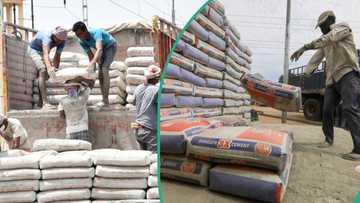Only Nigeria, South Africa, 2 Others Secured Over $100 Million Startup Funding in 2023
- Only startups in four African countries were able to raise funds above the threshold of $100 million in 2023
- According to the State of Tech in Africa report, African startups encountered formidable challenges in 2023.
- Despite experiencing a significant 79% decrease in funding, the fintech sector stood out as the top-funded industry
Legit.ng journalist Victor Enengedi has over a decade's experience covering Energy, MSMEs, Technology and the stock market.
Startups in Nigeria, South Africa, Kenya, and Egypt secured funding exceeding the $100 million threshold in 2023.
Startups in Kenya successfully secured an impressive $797 million in funding, surpassing their counterparts in Egypt, South Africa, and Nigeria, who obtained $617 million, $547 million, and $410 million in funding, respectively.
This was noted in TechCabal Insights' recently released 2023 Q4 edition of its State of Tech in Africa Report.

Read also
Nigeria’s FX market hits $1.83 billion in one week as naira gains in official and black markets
Excluding the prominent "Big 4" countries, startups from the Benin Republic, Tanzania, Rwanda, and the Democratic Republic of Congo secured funding rounds of $71 million, $61.95 million, $44 million, and $24.69 million, respectively.

Source: UGC
PAY ATTENTION: Share your outstanding story with our editors! Please reach us through info@corp.legit.ng!
Despite enormous economic issues, some Nigerian startups, including Moove, Sabi, and FairMoney, were able to raise significant amounts to expand their operations.
In a notable shift from prior years, Kenyan startups surpassed Nigeria to receive the highest funding among the Big 4 countries.
Key Kenyan startups such as Sun King and M-Kopa notably secured substantial funding throughout the year.
A challenging year for African startups
The analysis provided in the report delved into the challenges and successes experienced over the previous year, highlighting a positive outlook for the industry in various aspects for 2024.
The performance of local currencies in Africa was subpar, leading to diminished purchasing power and rendering digital products unaffordable for many.
Startups encountered escalated operating expenses as they earned revenue in local currencies but had to cover expenses for digital tools in foreign currencies.
The year 2023 witnessed the layoff of over 1,500 tech workers, and 15 startups ceased operations despite having raised a substantial sum of US $216 million in funding.
Furthermore, there was a notable decline in Venture Capital funding compared to the preceding two years.
VC funding reduced by 40.2% compared to 2022
In the past year, African startups secured a total of US$ 2.748 billion in funding through 500 deals, marking a 40.26% year-over-year decline from the US$ 4.6 billion raised in 2022.
Despite this decrease, the average deal size remained consistent at US$ 5.49 million, mirroring figures from the previous year.
Notably, only four mega deals were recorded throughout the year, a decrease compared to the figures observed in 2022.
Fintech remains appealing to investors
Despite experiencing a downturn, investors continue to find fintech investment appealing due to the ongoing growth of digital financial services.
Although fintech startups raised less funding than energy-focused startups in two of the four quarters of 2023, they dominated overall investment, amassing a total of US$1.08 billion throughout the year.
Energy startups followed closely behind, securing over US$800 million in funding.
The upsurge in funding for energy-based startups is attributed to the increasing adoption of cleantech solutions and alternative energy sources.
This was driven by the imperative to achieve the net-zero 2050 deadline as African nations strive to enhance energy consumption through renewable sources.
Startups in the logistics and healthcare sectors emerged as top funding recipients, garnering US$207.63 million and US$186.5 million, respectively.
African tech saw its largest acquisition deal ever
In 2023, there were 30 acquisitions, marking a 33.3% decrease compared to the previous year. Fintech acquisitions dominated the landscape, comprising 50% (16) of the total acquisitions.
Remarkably, Tunisian AI startup Instadeep was acquired by BioNTech, a German biotech company, for a staggering US$682 million, representing the largest acquisition deal ever recorded in Africa.
Speaking on acquisitions and mergers in Nigeria's tech space, Chuka Obi, co-founder of Klipboard, mentions Risevest's acquisition of Chaka as an interesting one.
He said:
Mergers offer companies the opportunity to combine their assets, such as complementary technologies, diverse talent pools, or enhanced research and development capacities.
A noteworthy example from Nigeria in 2023 is the acquisition of Chaka by Risevest, presenting both entities with the chance to integrate their infrastructures to enhance their respective products.
Through this collaboration, startups can strengthen their position to address evolving challenges and capitalize on emerging prospects.

Read also
After slashing price by 21%, Elon Musk picks Nigerian company to sell its Starlink in Africa
Massive layoffs in 2023
Throughout 2023, the African tech industry witnessed over 1500 tech workers being laid off, a consequence of companies confronting challenging macroeconomic conditions and encountering difficulties accessing follow-on funding.
Correspondingly, 15 startups ceased operations over the course of the year.
Certain startups, such as Cellulant, Alerzo, Chipper Cash, and Twiga Foods, underwent multiple rounds of layoffs.
These workforce reductions were not confined to any specific sector, highlighting the broader challenges that tech businesses encounter across the continent.
Outlook for 2023
In 2023, despite the funding slowdown, Venture Capital firms have amassed over a billion dollars in funds earmarked for deployment into startups addressing substantial challenges across the continent.
In a parallel effort, the United Nations Development Programme (UNDP), Rwanda, and seven other African nations introduced the "timbuktoo" initiative.
This initiative aims to inject $1 billion over a decade into 1000 tech startups across Africa while also providing ecosystem support.
Additionally, the reversal of certain government policies, such as restrictions on crypto, is anticipated to reignite interest in the sector and attract players from more established markets.
11 African startups selected for accelerator program
In related news, Legit.ng reported that Google launched a raft of programmes under its Google Accelerator schemes.
One of the programs is the AI-First initiative to support startups from Africa leveraging AI to solve local and global challenges.
The initiative provides startups with mentorship, technical guidance, networking opportunities, and a $350,000 allocation in Google Cloud Credits.
The program's first cohort, Google for Startups Accelerator, AI First, includes 11 companies, all of which use AI to impact the world positively.
PAY ATTENTION: Stay Informed and follow us on Google News!
Source: Legit.ng






